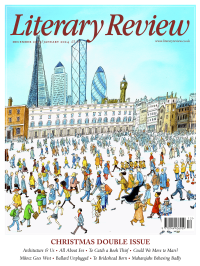Bernard Porter
State of Emergency
Trapped in History: Kenya, Mau Mau and Me
By Nicholas Rankin
Faber & Faber 560pp £25
The colonisation of Kenya is generally acknowledged to represent the worst of all the criminal enterprises that helped form the British Empire in the 19th and 20th centuries. In the 1950s, the colony underwent an ‘Emergency’ – others would call it a war – so bloody that afterwards the British government sought to spirit away most of the official documentation on it to a highly secret archive in Buckinghamshire (in the 2010s it was eventually opened up as a result of a court case pursued by some of the conflict’s African victims). The government of the day and the general public, informed by the tabloid press, attributed the whole affair to the innate barbarism of an African organisation known as the Mau Mau, whose atrocities both shocked and thrilled readers brought up on popular imperialist novels and films. Those atrocities were genuine. The Mau Mau administered dark ‘oaths’ reinforced by bloody rituals, and slaughtered – often ghoulishly – men, women and children, both white and native (the latter if they were seen as ‘collaborators’ or simply because they refused to take the oaths). White settlers lived in terror of these monsters, who at any moment could emerge from the forests, dressed in animal skins and wielding huge knives, to slay them in their beds (apparently the Mau Mau could smell their victims out from two miles away). ‘Only’ twenty-odd settlers were murdered in this way, as against thousands of Africans shot and hanged in reprisal, but the fear was real. It was exacerbated when the Mau Mau came under suspicion – as most protest movements did in that paranoid age – of being Soviet backed.
An alternative way of regarding the rise of the Mau Mau was as an extreme and deplorable but nonetheless understandable ‘nationalist’ response to the crimes of the white colonists, first of all in stealing the best lands from the Africans, and then in subjecting them to appallingly racist treatment as

Sign Up to our newsletter
Receive free articles, highlights from the archive, news, details of prizes, and much more.@Lit_Review
Follow Literary Review on Twitter
Twitter Feed
In 1524, hundreds of thousands of peasants across Germany took up arms against their social superiors.
Peter Marshall investigates the causes and consequences of the German Peasants’ War, the largest uprising in Europe before the French Revolution.
Peter Marshall - Down with the Ox Tax!
Peter Marshall: Down with the Ox Tax! - Summer of Fire and Blood: The German Peasants’ War by Lyndal Roper
literaryreview.co.uk
The Soviet double agent Oleg Gordievsky, who died yesterday, reviewed many books on Russia & spying for our pages. As he lived under threat of assassination, books had to be sent to him under ever-changing pseudonyms. Here are a selection of his pieces:
Literary Review - For People Who Devour Books
Book reviews by Oleg Gordievsky
literaryreview.co.uk
The Soviet Union might seem the last place that the art duo Gilbert & George would achieve success. Yet as the communist regime collapsed, that’s precisely what happened.
@StephenSmithWDS wonders how two East End gadflies infiltrated the Eastern Bloc.
Stephen Smith - From Russia with Lucre
Stephen Smith: From Russia with Lucre - Gilbert & George and the Communists by James Birch
literaryreview.co.uk